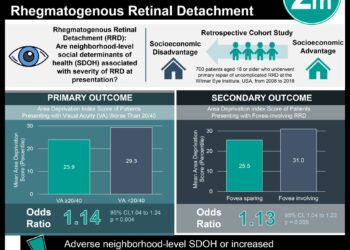Duration, type of poverty affect children’s readiness for school
1. In this retrospective cohort study, researchers found that children born into poverty were less likely to be ready for school, regardless of the type of poverty their family experienced.
2. In families that were able to transition out of poverty, children were significantly more likely to be prepared for school, specifically if their family was able to transition prior to the child turning age 2.
Evidence Rating Level: 2 (Good)
Study Rundown: Early childhood is a critical developmental time, and experiencing poverty during that phase may significantly impact a child’s ability to succeed in later life. Few studies have specifically elucidated the relationship between the types or durations of poverty and their association with children’s readiness for school. In this study, researchers looked at the objectively assessed school readiness of children born into various types of poverty, grouped largely as “household” versus “neighborhood” poverty, based respectively on the family’s individual income and the average income of the area in which they lived. The study also considered how long each family was in poverty, and whether or not the family was able to transition out of poverty prior to the child turning age 2. Researchers found that regardless of the type of poverty, children born into poverty were significantly less likely to be prepared for school as compared to children not born into poverty. Additionally, children whose families were able to transition out of poverty prior to the child turning age 2 were significantly more likely to be ready for school as compared to those who did not transition out of poverty prior to that time. Though this study was performed in Canada, where social welfare systems differ from those in the U.S., the findings both highlight the importance of stability and resources in early life for setting children up for future success, as well as emphasize the need for early intervention to support growing families in their transition out of poverty.
Click here to read the study, published today in Pediatrics
Relevant Reading: The Roles of School Readiness and Poverty-Related Risk for 6th Grade Outcomes
In-Depth [retrospective cohort]: Researchers collected data from the Population Research Data Repository, a bank of data specifically recording various indicators of health status in Canada’s Manitoba, an area which scores slightly below the national average on educational tests and is populated by a large aboriginal population. Poverty was divided into 2 groups: “household poverty” (if the child’s mother received Employment and Income Assistance during the month of birth) and “neighborhood poverty” (if the family lived in a neighborhood in the lowest quintile for mean income at the time of birth). The study ultimately included 46 586 children, 11 619 of whom were born into poverty (24.9%). Of the 24.9% born into poverty, 2951 (25.4%) experienced both types of poverty, 2766 (23.8%) experienced only household poverty, and 5,902 (50.8%) experienced only neighborhood poverty. Researchers found that children born into poverty were less likely to be ready for school, whether their families experienced household, neighborhood, or both types of poverty, compared to children not born into poverty (p < .05). Children were significantly more likely to be prepared for school if their family transitioned out of prior to the child turning age 2 (p < .05).
Image: PD
©2019 2 Minute Medicine, Inc. All rights reserved. No works may be reproduced without expressed written consent from 2 Minute Medicine, Inc. Inquire about licensing here. No article should be construed as medical advice and is not intended as such by the authors or by 2 Minute Medicine, Inc.







